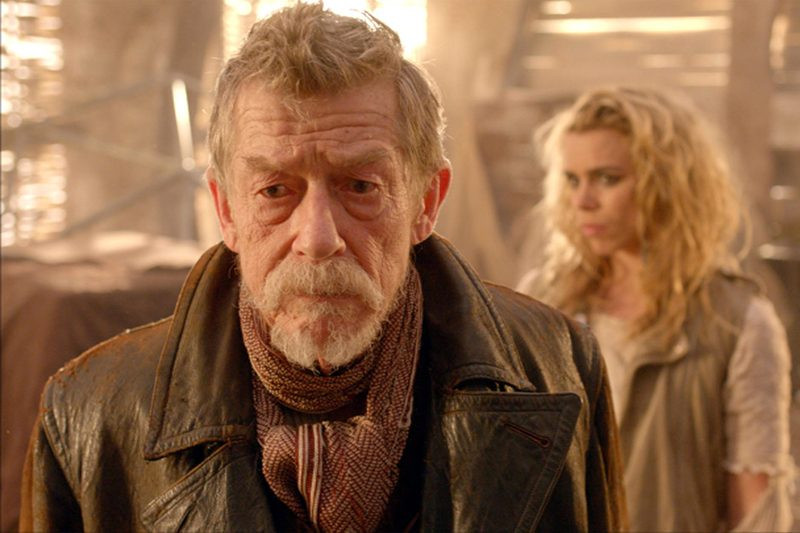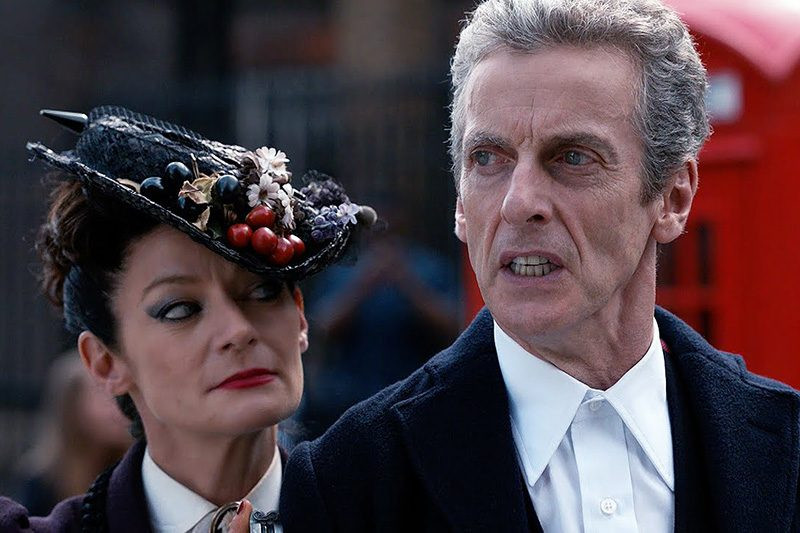The question of the Doctor’s real name is one of the most enduring mysteries in the lore of Doctor Who. It’s a secret the Doctor himself jealously guards, hinting that revealing it would carry significant, even universe-altering consequences. From the very first encounters with River Song, where the Tenth Doctor reacted with alarm at her knowledge of his name, to warnings from villains and prophecies, the Doctor’s true moniker has been shrouded in intrigue. Why such secrecy? What could be so important about a name? And more importantly, what could it be? Let’s delve into the enigma and explore the most compelling theories surrounding the Doctor’s hidden identity.
The Doctor: A Name Chosen, Not Given
 John Hurt as The War Doctor
John Hurt as The War Doctor
One of the most significant clues suggests that “the Doctor” isn’t a birth name at all, but a title deliberately chosen. In “The Name of the Doctor,” the Eleventh Doctor, portrayed by Matt Smith, reveals to Clara that he adopted the name “Doctor” as a solemn promise. This vow encapsulated his core values: to be compassionate, never cowardly, persistent, and never to yield. During the devastating Time War, the incarnation known as the War Doctor actively rejected this title, feeling his actions in the conflict betrayed the ideals it represented. This implies a profound personal significance attached to the name, far beyond mere identification.
Further reinforcing this idea, the Valeyard, a dark reflection of the Doctor’s own potential future, dismisses the name as simply an alias. Even the Doctor’s nemesis, the Master, in his John Simm incarnation, mocks the Doctor for identifying as “the man who makes people better,” suggesting a degree of self-aggrandizement in the chosen title. However, River Song offers a different perspective. She posits that the very word “Doctor,” meaning healer and wise person across countless worlds, originates from legends and tales about the Doctor himself. This flips the script, suggesting the Doctor’s chosen name has become a universal archetype. Interestingly, the Doctor does hold numerous actual doctorates, even jokingly claiming one in cheese-making, blurring the lines between title and qualification.
John Smith: The Earthly Alias
 David Tennant and Freema Agyeman in Doctor Who (BBC)
David Tennant and Freema Agyeman in Doctor Who (BBC)
Beyond “the Doctor,” the most frequently used alias is undoubtedly “John Smith.” This unassuming name serves as the Doctor’s standard pseudonym whenever he spends extended periods on Earth. Jon Pertwee’s Third Doctor famously adopted it during his exile on Earth in the 1970s, and the alias has persisted through various incarnations, including the Twelfth Doctor’s stint as a caretaker at Coal Hill School. In a dramatic turn, the Tenth Doctor even temporarily transformed himself into a human named John Smith to evade the Family of Blood, fully embracing the identity. The ubiquity of this alias is even humorously cemented by its appearance on a library card, highlighting the Doctor’s comfortable, if perhaps legally questionable, use of the name.
Theta Sigma: A Gallifreyan Nickname?
A glimpse into the Doctor’s Time Lord academy days offers another potential name: Theta Sigma (ΘΣ). This nickname, revealed by Drax, a contemporary from the Doctor’s “class of ’92,” suggests a more informal moniker used amongst peers on Gallifrey. Introduced in “The Armageddon Factor,” Theta Sigma was initially proposed, perhaps somewhat jokingly by writer Anthony Read, as a possible answer to the series’ title question. However, this idea was largely disregarded and later confirmed by the Seventh Doctor to be merely a nickname in “The Happiness Patrol.”
Intriguingly, the first Doctor Who reference guide, “The Making of Doctor Who” (1972), penned by script editor Terrance Dicks and writer Malcolm Hulke, casually proposed “δ³Σx²” as the Doctor’s real name. Theta Sigma could then be interpreted as a simplified, more pronounceable, and humorous variation of this complex Gallifreyan name. Whether a genuine clue or playful misdirection, Theta Sigma adds another layer to the mystery.
Titles of Fear: Names Bestowed by Enemies
 Matt Smith in Doctor Who (BBC)
Matt Smith in Doctor Who (BBC)
The Doctor’s enemies, throughout time and space, have gifted him with a collection of formidable and often terrifying titles. Names like “The Oncoming Storm,” “The Beast,” “Predator of the Daleks,” “The Great Exterminator,” and “Destroyer of Worlds” speak volumes about the Doctor’s impact on the universe, albeit from the perspective of those who oppose him. These titles, while not his given name, reflect the fear and respect, however grudging, he commands. They are names earned through actions, highlighting his power and influence rather than any inherent identity. Ironically, these intimidating epithets might be considered more revealing of the Doctor’s character than any personal name could be.
Unpronounceable Truths: A Name Beyond Comprehension?
The Sixth Doctor once cryptically informed Peri that his real name was unpronounceable to human tongues. While this statement, delivered in a radio drama, might be of questionable canonicity, it introduces the idea that the Doctor’s true name could be inherently alien, existing outside the linguistic capabilities of humans. Later, the Twelfth Doctor, in his final moments, echoed this sentiment, suggesting his name was incomprehensible except perhaps to a child with a pure heart. This hints at a name that transcends simple language, possibly resonating on a deeper, perhaps even telepathic or emotional level, making it inaccessible to most.
Doctor Who: Hidden in Plain Sight? The Meta-Answer
 Peter Capaldi and Michelle Gomez in Doctor Who (BBC, HF)
Peter Capaldi and Michelle Gomez in Doctor Who (BBC, HF)
Perhaps the most audacious and meta-theoretical suggestion is that the Doctor’s real name is, simply, “Doctor Who.” Evidence for this theory surprisingly surfaces as early as 1966 in “The War Machines,” where the supercomputer Wotan explicitly demands, “Doctor Who is required, bring him here.” While this could be attributed to a writing oversight, its inclusion in the show’s canon is undeniable. Further instances pepper the series: the Second Doctor using “Doctor von Wer” (Doctor of Who) as a German pseudonym, and signing messages as “Dr W.”
Dorium Maldovar’s ominous warning, “The question that must never be answered, hidden in plain sight. The question you’ve been running from all your life. Doctor who? Doctor who? Doctor who?” directly points to the show’s title itself as the concealed answer. Missy, in “World Enough and Time,” even proclaims “Doctor Who” to be his chosen name, claiming he initially dropped the “Who” for subtlety. The Doctor himself, while not fully agreeing with Missy’s interpretation, acknowledges, “I like it,” when Nardole questions this assertion.
This theory proposes that the mystery isn’t about uncovering a forgotten Gallifreyan name, but recognizing that the question itself, “Doctor Who?”, is the answer. The Doctor is defined by the ongoing question of his identity, purpose, and nature. The name is “hidden in plain sight,” constantly presented yet perpetually questioned.
The Timeless Child: Redefining Identity
The revelations of “The Timeless Children” in 2020 add another layer of complexity. The Doctor’s origins are rewritten, suggesting a past far older and more enigmatic than previously understood, potentially predating Time Lord society itself. This retcon implies that even the Doctor might be unaware of their original birth name, lost to the mists of a forgotten history. In this context, the question of the “real name” becomes even more profound, perhaps even unanswerable.
Ultimately, the enduring mystery of the Doctor’s real name is likely intentional. It’s a narrative thread woven throughout the series, prompting speculation and adding to the character’s mystique. Whether it’s a chosen title, a forgotten Gallifreyan word, an unpronounceable concept, or simply the question itself, “Doctor Who?”, the true name remains elusive. Perhaps, in the end, the name “the Doctor” is the only name that truly matters. It represents a promise, a legend, and a timeless hero who continues to ask, and answer, the question: Doctor Who?
